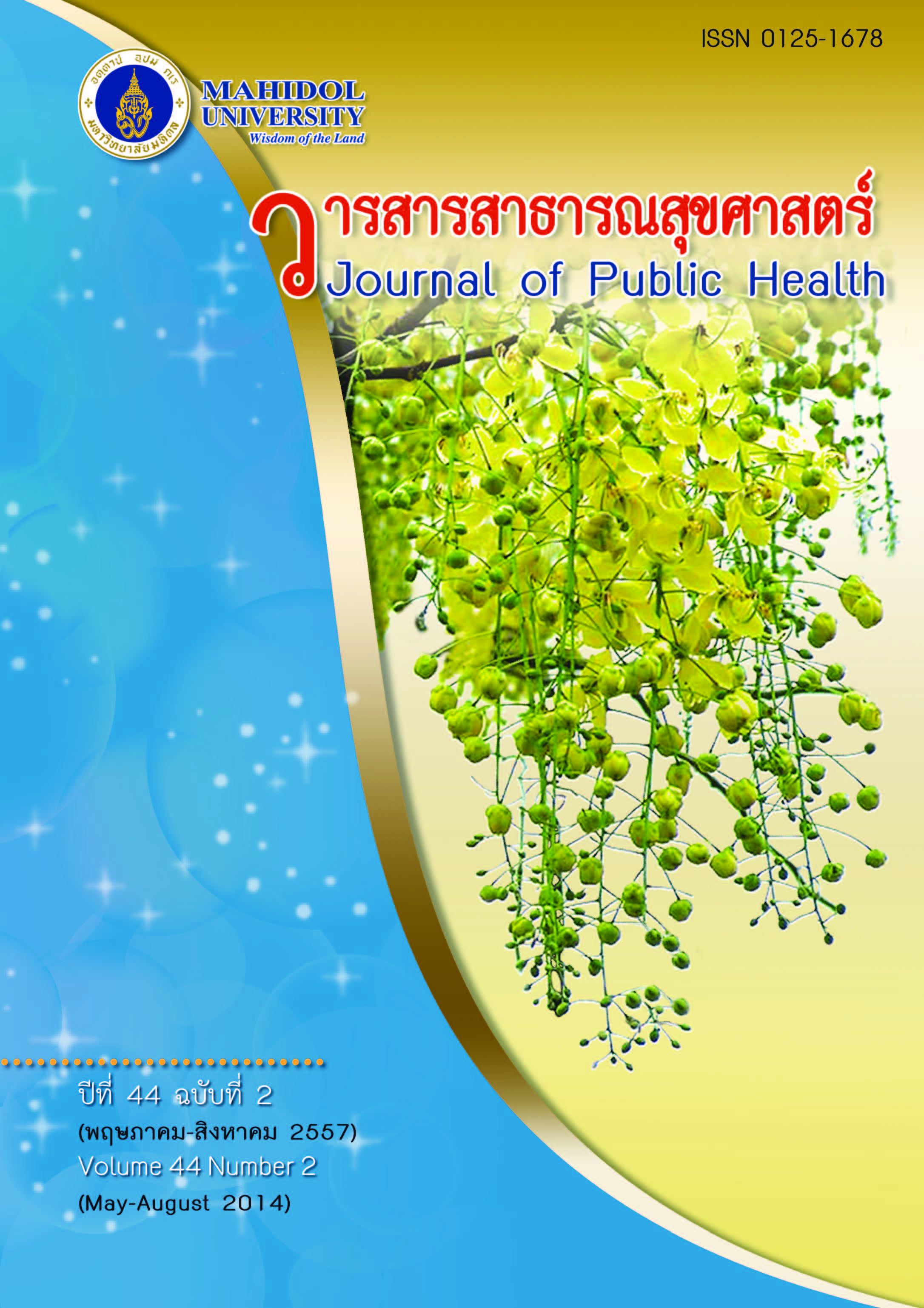มาตรการเพื่อการลดปัญหาแอลกอฮอล์ในชุมชนพหุวัฒนธรรม กรณีศึกษา อำเภอหาดใหญ่ จังหวัดสงขลา
Keywords:
มาตรการชุมชน, ปัญหาแอลกอฮอล์, การมีส่วนร่วม, การบริภคแอลกอฮอล์, measurement, alcohol problem, participation, alcohol consumptionAbstract
บทคัดย่อ
ปัญหาแอลกอฮอล์มีผลกระทบต่อทั้งระดับบุคคล ครอบครัว ชุมชนและสังคม การวิจัยเชิงคุณภาพนี้ มีวัตถุประสงค์เพื่อศึกษามาตรการในการแก้ไขปัญหาแอลกอฮอล์ในพื้นที่พหุวัฒนธรรม โดยมีกลุ่มเป้าหมายคือ ผู้นำท้องถิ่น/ประชาชน เจ้าหน้าที่ตำรวจและร้านค้าที่จำหน่ายแอลกอฮอล์ใน 6 ชุมชน รวมทั้งสิ้นจำนวน 51 ราย เก็บข้อมูลโดยการสัมภาษณ์ และสนทนากับกลุ่มเป้าหมาย ระหว่าง เดือนมกราคม – กรกฎาคม พ.ศ. 2555 กลุ่มเป้าหมายอายุเฉลี่ย 49 ปี ส่วนใหญ่เป็นเพศหญิง พบว่า ผู้นำท้องถิ่นและประชาชนในชุมชนมีความเห็นว่าการดื่มเครื่องดื่มแอลกอฮอล์เป็นปัญหาส่วนบุคคลซึ่งประชาชนในชุมชนไม่ต้องการมีส่วนร่วมในการแก้ปัญหาเพราะไม่ใช่หน้าที่และไม่มีอำนาจ โดยในชุมชนที่ศึกษาทั้ง 6 ชุมชนไม่มีมาตรการแก้ปัญหาที่เป็นรูปธรรมและไม่มีการจำกัดจำนวนร้านจำหน่ายเครื่องดื่มแอลกอฮอล์ในชุมชน ผู้นำศาสนาทั้งศาสนาพุทธและอิสลามมีความเห็นว่าการแก้ปัญหาดื่มเครื่องดื่มแอลกอฮอล์ควรส่งเสริมกิจกรรมทางศาสนาสรรพสามิตควรเพิ่มอัตราภาษีเพื่อราคาเครื่องดื่มแอลกอฮอล์ เจ้าหน้าที่ตำรวจขาดความตระหนักในเรื่องการจับกุม ร้านค้า จำหน่ายเครื่องดื่มแอลกอฮอล์โดยไม่ได้ตรวจสอบอายุผู้ซื้อ ปัญหาแอลกอฮอล์จึงเป็นปัญหาในชุมชนที่ยังไม่มีมาตรการในการแก้ปัญหา นอกจากการสอนทางศาสนาจะช่วยลดปัญหาได้ ดังนั้นแต่ละครอบครัวจึงต้องป้องกันและแก้ปัญหาแอลกอฮอล์ในครอบครัวของตนเอง
Measures to Reduce the Alcohol Problems among Multicultural Communities:
A Case Study of Hat Yai District, Songkhla Province
ABSTRACT
Alcohol problems affect humans, families, communities and societies. This research was qualitative with the aim to study the measure of alcohol problems in a multicultural area. The subjects were: alcohol sellers, residents, local administrators, religious leaders, police officers and excise officers. Data was collected by interview and focus group discussion from January – July 2012. The average age of subjects was 49 years and most of them were women. The results were as follows: The head administrator believed that drinking behavior is a human right and individual problem, although it may affect their health, and their family as well as the community. All six communities had no formal regulation to reduce alcohol problems and uncontrolled/unlimited number of alcohol businesses. The religious leaders’ opinions were to teach religion to high-risk groups to reduce the problems. The residents did not want to participate with this problem because they thought that it’s not their responsibility and they had no power to solve the problem and would be a waste of their time, although these problems annoyed them. The excise officer said that they do arrest the owners of illegal alcohol shops around 2-3 times per year but the policy of the Excise Department was to increase the number of alcohol shop registrations. Most of the police officers were not concerned with alcohol problems because getting involved would not increase their chance of promotion. The alcohol sellers rarely checked the customer’s id for proof of age. The alcohol problem was not a concern of the government sector and communities because they thought that alcohol problems have to be solved by the family and the drinker. Therefore, apart from religious teaching, we could not find any preventative measures for reducing alcohol problems in the study area.
Downloads
Issue
Section
License
Creative Commons License CC-BY-ND


